Our sons with Fragile X Syndrome typically go to bed early and rise early. Sometimes they jump on us while we are sleeping at 3 a.m., excited to start their day. For heaven’s sake, why? The answer may come from Carolyn Beebe Smith, PhD, senior investigator, Section on Neuroadaptation and Protein Metabolism, National Institute of Mental Health, National Institutes of Health, Bethesda, Maryland. She is studying why children, in particularly boys, with FXS have problems sleeping.
Read moreautism
Mark Bear’s Goal: Disease-Modifying Treatments for Fragile X

Researcher Mark Bear, PhD, Picower Professor of Neuroscience, sees success developing disease-modifying treatments for Fragile X syndrome and other developmental brain disorders. Finally, hope. And it comes from his lab, The Picower Institute for Learning and Memory, Department of Brain and Cognitive Sciences, Massachusetts Institute of Technology.
Read moreSensory Hypersensibility in Fragile X Syndrome and BK Channel Openers

With $366,100 in grants from FRAXA Research Foundation, these investigators at the University of Orleans studied sensory abnormalities in Fragile X mice and test the ability of a class of drugs, BK channel openers, to rescue these abnormalities.
Read moreKimberly Huber, PhD, Explores Hyperexcitability in Fragile X Syndrome
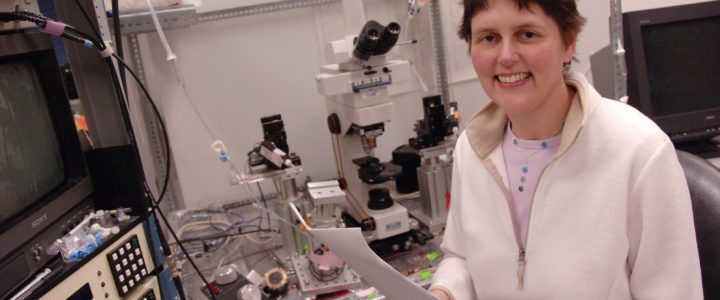
Ever wonder why your child with Fragile X suddenly screams for no apparent reason or jumps and flaps uncontrollably seemingly for hours? You got it: hyperexcitability. But what exactly causes it? And what can fix it? Kimberly Huber, PhD, is working long and hard in her lab to answer those questions. Dr. Huber, professor, Neuroscience, UT Southwestern Medical Center, is seeking to understand how FMRP regulates connections between brain cells, called synapses, and the function of brain circuits, which are several connected brain cells.
Read moreIdentifying Biomarkers for Fragile X Syndrome – A Study in Argentina
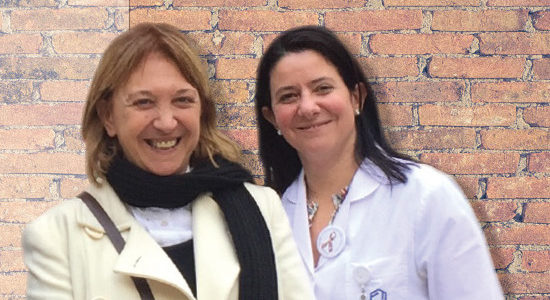
Bio·mark·er, noun, a distinctive biological or biologically derived indicator of a process, event, or condition. Doesn’t help? Well, it’s perfectly clear to Argentinian researchers Patricia Cogram, PhD, and Paulina Carullo, MD, from the FLENI Institute in Buenos Aires, Argentina. They understand there is an urgent need for validated biomarkers after recent Fragile X syndrome clinical trials have failed on their primary endpoints.
Read moreMemory Lane: New Research to Improve Memory in Fragile X Mice
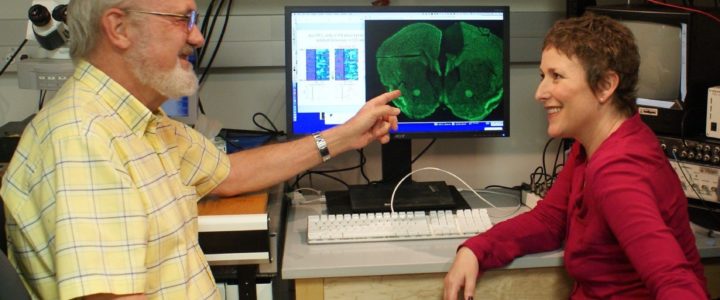
University of Texas at Austin Researchers Daniel Johnston, PhD, and Jennifer J. Siegel, PhD, explore ways to Iimprove memory in Fragile X mice.
Read moreNew compound from Anavex Improves Learning and Behavior in Fragile X Mice
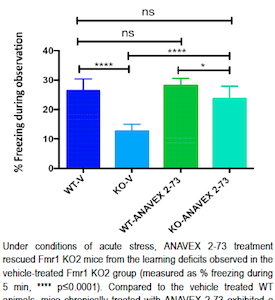
A potential new treatment for Fragile X syndrome is showing promise. While still early in development, the investigational drug was able to improve intellectual, learning and hyperactivity measures in a mouse model of Fragile X syndrome. Anavex 2-73 is a sigma-1 receptor agonist being developed for autism spectrum disorders, including Rett syndrome and Fragile X syndrome, and for Alzheimer’s disease. Anavex Life Sciences presented the data at the Gordon Research Conference for Fragile X and Autism-Related Disorders, held June 5-10, 2016 in Mount Snow, VT. The study was sponsored by FRAXA, via the FRAXA Drug Validation Initiative, and performed by Fraunhofer Chile Research, in Santiago, Chile.
Read moreDouble Down: Fragile X Clinical Trial Combines Two Available Drugs
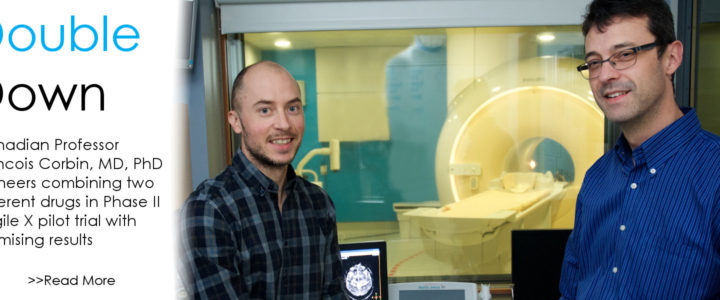
If all the science world’s a stage, Fragile X researchers are more than merely players. They are center stage. So believes Francois Corbin, MD, PhD, professor, Université de Sherbrooke, Canada, who directs the university’s Fragile X Clinic. Corbin, who has received more than $100,000 in FRAXA support since 2012, is leading a pilot randomized Phase II trial, exploring the tolerability and the synergistic effect of a combined therapy.
Read moreFragile X Fruit Fly Research Bears Fruit

A new FRAXA-funded study shows how the hormone insulin – usually associated with diabetes — is involved in the daily activity patterns and learning deficits in the fruit fly model of Fragile X Syndrome (FXS). The study also reveal a metabolic pathway that can be targeted by new and already approved drugs to treat Fragile X patients, notably metformin.
Read moreAbnormalities of Synaptic Plasticity in the Fragile X Amygdala

With a $110,050 grant from FRAXA Research Foundation from 2005-2016, Dr. Sumantra Chattarji at the National Center for Biological Sciences researched how the amygdala is affected by Fragile X syndrome. Results published.
Read moreCrossroads of Fragile X and Alzheimers Research

Last week researchers at VIB Leuven in Belgium published evidence that a brain pathway involving the protein APP (Amyloid Precursor Protein) plays a vital role in development of Fragile X syndrome, one of the most common causes of autism. Scientists led by Dr. Emanuela Pasciuto in the laboratory of Prof Claudia Bagni published findings of their study in the journal Neuron.
Read moreBoston Bruins Grant Funds New Fragile X Research

Bruins Foundation Executive Director Bob Sweeney pledging a $90,000 donation to FRAXA Research today at Shared Living Collaborative’s Gateway Farm in Merrimac, MA. The award will enable the organization to fund an entirely new research project aimed at developing new treatments for Fragile X, a genetic syndrome that is the most common inherited cause of autism.
Read moreFragile X Programs at UMASS – University of MA, Worcester

Fragile X Syndrome Behavioral Health Clinic The Center for Autism and Neurodevelopmental Disorders (CANDO) is opening a specialty clinic for individuals with Fragile X Syndrome (under the direction of Dr. Jean Frazier) to evaluate and provide treatment for behavioral challenges.
Read moreThe Endocannabinoid System in a Mouse Model of Fragile X Syndrome

With a $128,500 grant over 2011-2013 from FRAXA Research Foundation, Drs. Bradley Alger and Ai-Hui Tang at the University of Maryland researched endocannabinoid pathways in Fragile X.
Read moreInhibitors of STEP as a Novel Treatment of Fragile X Syndrome

With a $349,000 grant from FRAXA Research Foundation from 2008-2015, Dr. Paul Lombroso and his team at Yale University researched if inhibiting STEP could reduce behavioral abnormalities in Fragile X syndrome. Results published.
Read moreBcl-xL Inhibition as a Therapeutic Strategy for Fragile X Syndrome

Scientists have found increases in the numbers of neurons in brain regions of autistic children, suggesting a problem in developmental programmed cell death pathways. One of the most important effectors of neuronal survival during brain development is the “anti-cell death” protein Bcl-xL. While the normal function of Bcl-xL is to maintain a healthy number of neurons and synapses, over-expressed Bcl-xL can cause an overabundance of synaptic connections. This may be happening in Fragile X.
Read moreSeizures in Fragile X Syndrome and Therapeutic Potential of NMDA Receptor Antagonists

With a $90,000 grant from the FRAXA Research Foundation, Dr. Robert Wong is investigating how seizures are generated in Fragile X neurons. More generally, he is looking at how synapses are modified to enable learning and memory and how this process is impaired in Fragile X.
Read moreScientists Uncover Trigger for Fragile X Syndrome

A new study led by Weill Cornell Medical College scientists shows that Fragile X syndrome occurs because of a mechanism that shuts off the gene associated with the disease. The findings, published today in Science, also show that a compound that blocks this silencing mechanism can prevent Fragile X syndrome – suggesting a similar therapy may be possible for 20 other diseases that range from mental retardation to multisystem failure.
Read moreMolecular mechanisms: Enzyme blockers help Fragile X mice
Dr. Jope won the 2013 FRAXA Pioneer Award for this work. The mood stabilizer lithium and two other drugs that block an enzyme called GSK-3 reverse cognitive deficits in a mouse model of Fragile X.
Read moreSocial Behavior as an Outcome Measure for Fragile X Clinical Trials

One of the features of the Fragile X mouse model which is relevant to the human Fragile X syndrome (and autism) is social behavior. Several tests show consistent social behavioral abnormalities in the Fragile X mouse model. With a $140,000 grant from FRAXA Research Foundation in 2012-2013, Dr. Willemsen at Erasmus University used social behavior tests to measure the effectiveness of several drug strategies.
Read moreGlycogen Synthase Kinase-3 (GSK3), Lithium and Fragile X

With $208,000 in funds from FRAXA Research Foundation, Dr. Richard Jope and his team at the University of Miami tested whether newly developed, highly specific inhibitors of GSK3 can reduce behavioral abnormalities in Fragile X mice.
Read moreThe mTOR Pathway in Fragile X Syndrome
With a $90,000 grant from FRAXA Research Foundation over 2012-2013, Dr. Eric Klann and Postdoctoral Fellow Dr. Aditi Bhattacharrya of New York University investigated alterations in the mTOR pathway in Fragile X syndrome – which is also known to be defective in several forms of autism. Their work was published in September 2012 and received international attention.
Read moreFragile X Treatment Strategy Emerges from FRAXA Research: IGF-1

New Zealand-based biotech Neuren Pharmaceuticals has announced impressive preclinical results in the Fragile X mouse model with Trofinetide. These compounds are examples of a new class of drugs based on insulin-like growth factors (IGF-1). IGF analogs are currently considered the most promising approach for treating Rett Syndrome, a fatal genetic disorder that affects only girls, and one of the other leading genetic models for the study of autism (along with Fragile X). The surprising news is that FRAXA researchers have found that this treatment strategy works even better in Fragile X knockout mice than in Rett syndrome mice! FRAXA’s strategy is to find and target the critical bottlenecks which block the way to development of treatments.
Read moreEffects of minocycline on vocal production and auditory processing in a mouse model of Fragile X

With $135,000 in grants from FRAXA Research Foundation over several years, Dr. Khaleel Razak and Dr. Iryna Ethell explored robust biomarkers relevant to the FXS and the efficacy of minocycline treatment.
Read morePhase 2b Clinical Trial of Arbaclofen in Autism Has Disappointing Results
Phase 2b clinical trial of Arbaclofen in Autism Seaside Therapeutics reports the study did not show improvement on the primary endpoint of social withdrawal, but it did demonstrate improvement on the Clinical Global Impression of Severity scale.
Read more
